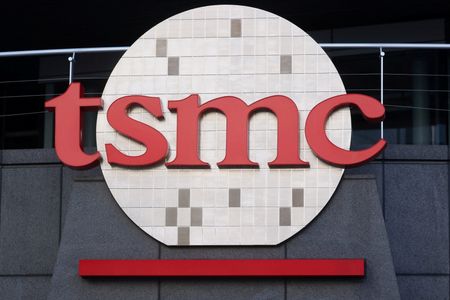By Yimou Lee and Faith Hung
TAIPEI (Reuters) -TSMC, the world’s largest chipmaker and a major Apple and Nvidia supplier, forecast second-quarter sales may rise as much as 30% as it rides a wave of demand for semiconductors used in artificial intelligence (AI) applications.
The surging need for processors for AI left executives at Taiwan Semiconductor Manufacturing Co (TSMC), which investors watch closely as a bellwether for the chip industry, plainly stating just how strong the demand was.
“Almost all the AI innovators are working with TSMC to address the insatiable AI-related demand for energy efficient computing power,” CEO C.C. Wei said during the company’s first-quarter earnings call.
“AI-related data centre demand is very, very strong,” he said, adding that the shift from traditional servers to AI servers is “favourable” to TSMC.
TSMC has benefited from the AI wave that has helped it weather the tapering off of COVID-19 pandemic-led electronics demand and pushed the company’s stock to a record.
AI servers are expected to account for a low-teens percentage of its 2024 revenue, more than double from last year, with that figure rising to more than 20% of revenue by 2028, it said.
Demand for auto chips would fall this year, compared with a previous estimate of growth, it added.
Looking ahead, TSMC said it expects business in the second quarter to be supported by strong demand for its industry-leading 3 nanometre (nm) and 5nm technologies, although that strength would be partially offset by sluggish demand for smartphones.
It maintained its guidance for capital spending this year at $28 billion to $32 billion, compared with last year’s $30.45 billion, and said 70%-80% of that would go towards advanced technologies.
For 2024, the company said it expects revenue to rise in the low- to mid-20% range in U.S. dollar terms.
“Looking at 2024, macro economy and geopolitical uncertainties persist, which could further affect consumer confidence and end-market demand,” TSMC said in a statement.
The online earnings call was briefly suspended for around 15 minutes shortly after it began due to technical issues with investors and analysts being unable to access it.
NET PROFIT RISES
Earlier on Thursday, TSMC posted a 9% rise in first-quarter net profit that beat market expectations, boosted by strong demand for advanced chips.
TSMC saw January-March net profit rise to T$225.5 billion ($6.98 billion) from T$206.9 billion a year earlier.
The profit beat a T$218.1 billion LSEG SmartEstimate, which is weighted toward forecasts from analysts who are more consistently accurate.
TSMC, Asia’s most valuable listed company, said first-quarter revenue rose 13% year-on-year to $18.87 billion, better than the company’s previous forecast of $18 billion to $18.8 billion. The company last week announced first quarter revenue in Taiwan dollars, coming in at T$592.64 billion.
Capital expenditure in the first quarter was $5.77 billion, TSMC said, compared with $5.24 billion in the fourth quarter of 2023.
TSMC’s Taipei-listed shares have surged 36% so far this year. The stock was flat on Thursday ahead of the results versus a 0.4% gain for the benchmark index.
The chipmaker, which is spending billions building new plants overseas including in the United States, Japan and Germany, said it was “strategically important” to expand its global manufacturing footprint and was on track for production in the U.S. state of Arizona in the first half of 2025.
The company announced last week it would expand its planned investment in chip production in Arizona by $25 billion to $65 billion and to add a third fabrication plant there by 2030.
That announcement followed a U.S. Commerce Department statement it would award TSMC a $6.6 billion subsidy for the Arizona plant and up to $5 billion in low-cost government loans.
($1 = 32.3190 Taiwan dollars)
(Reporting by Yimou Lee and Faith Hung; additional reporting by Ben Blanchard; Editing by Anne Marie Roantree, Shri Navaratnam and Christian Schmollinger)

